#MeToo: A collective call to members of our community
Editor’s note: The rising global awareness of sexual abuse, harassment and discrimination has been truly phenomenal in the last few weeks, touching virtual every aspect of society, including piping and drumming. Our recent Blogpipe article on the subject pertained mainly to issues and policies within our scene and associations overall. American-born piper Megan Canning, who has lived in the UK and Africa for more than 10 years, approached us with her personal and professional take on the matter. We are pleased to bring readers her frank and honest thoughts that integrate her own experience and observations, which will undoubtedly keep this necessary and constructive dialog going. Only through open discussion and asking questions about important issues and inequities will we gain answers and evoke needed change.
By Megan Canning
Like millions of other women around the world, I’ve watched as the words #metoo have flooded my social media pages.
Reading the intimate stories of friends and colleagues who have come forward with experiences of harassment, abuse and sexual assault, has unleashed in me a sense of collective rage, but also a feeling of collective empowerment. What I have not felt, however, is surprise. After all, like most women, I am among those who have also been able to write #metoo.
I can hardly imagine a woman who couldn’t write the same. For me, the timing of this rallying cry is apt. Only two weeks ago, I was sitting in a pub in Edinburgh with some pipe band friends, discussing the extent to which sexual harassment and violence is so normalized in our social world, that we often fail to recognize it at all. My female friend and I, who I’ve played with in pipe bands for several years, were jointly arguing that if men were to actually experience even for one day the kind of harassment that women put up with in so many facets of their daily lives, they would look at the world completely differently.
Fast forward to the #metoo movement – already in existence, but made prominent this past week by the high-publicity Harvey Weinstein scandal – and what we’re seeing is exactly that: the power of women coming forward in numbers, and the shock of men struggling to come to terms with the true extent of a violence that has always been right in front of them.
So much about the Harvey Weinstein case makes me think about my 23 years of experience in pipe bands. The pipe band world is not particularly worse for harassment than any other sector of society. (If anything, the plurality of women’s experiences documented in the last week alone highlights the pervasiveness of this violence across every conceivable context). However, the pipe band world certainly embodies a number of characteristics that mean that discrimination, harassment, and even abuse, sadly find an easy home.
pipes|drums published a Blogpipe article reflecting on the experiences of women pipers and drummers over the decades. From the early pioneers of women’s piping in the 1970s, to the modern-day women continuing to push the boundaries, it’s fantastic to celebrate the advances that women have made in recent years.
However, the article questions the extent to which we can really argue that things have changed – or, at least, it questions the pace of change – and I agree completely with this analysis. How can we celebrate the increased number of women in pipe bands today, but not ask why there are still so few women in positions of power? Where are the women judges, the women pipe-majors, the women lead-drummers? The numbers are scant.
And while there will invariably be a time-lag for judging panels whereby we might need to wait until the female competitors of today retire from competition and go into adjudication, there is no good reason why women shouldn’t be as equally represented in leadership roles, as they are in playing roles. Certainly, when we think about the thousands of pipe bands around the world that are almost invariably led by men, we must ask ourselves how we can claim we have arrived at a state of gender equality, simply because we can point to the advances of some women today, relative to the state of inequality in the 1970s.
For women like me who have spent decades of their lives playing in pipe bands, we can all point to the ways in which gender discrimination has affected us, both big and small. There are the micro-aggressions, like the derogatory terminologies we use to describe unfavourable practices, in gendered terms. We say “He plays a girl’s reed” when we intend to demean someone for playing an easy set of pipes; we say someone “blows like a girl” when we are referring to blowing unsteadily; we say someone “hits the drum like a girl” when we are suggesting they play timidly. Of course, it may often be the case that the physicality of piping and drumming means there will be variation (and to some extent gender-based variation) in the strength with which we approach our instruments.
But long gone are the days where one’s ability to play a gut-busting reed was a necessary sign of quality – let alone the days where it represented some kind of normative masculinity – and some of the best pipers these days, male and female alike, play easy sets of pipes. The extent to which women are bothered by micro-aggressions might vary and, for many, such colloquialisms have hardly any bearing on an overall pipe band experience that is nothing short of enjoyable. For others, however, these small things, coupled with bigger things, such as the demeaning and often sexualized behaviour they’ve experienced from male peers, leaders, and judges, make it much less enjoyable to participate.
The #metoo campaign tells us a lot about the ways in which women’s experiences of violence are silenced in male spaces. Whether it’s micro-aggressions, discrimination, a persisting gap in gender parity, or sexual harassment and physical and sexual assault, when it happens, this kind of abuse plays a devastatingly sinister and pervasive role in how we as women experience our social world. It is absolutely unacceptable that we should have to put up with this. This is true in all aspects of our lives, in both public and private spaces. It is also true in pipe bands, where our ability to participate and glean enjoyment from our hobby is often compromised by gender-based violence and discrimination.
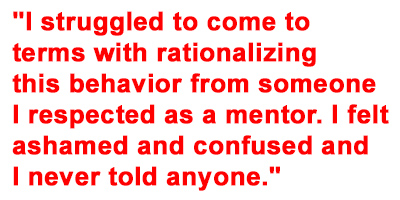 I’ve played in pipe bands for more than 20 years. I was just 14 years old when a prominent pipe band judge – more than four times my age – first gave me alcohol after a competition, and invited me back to his hotel room. I remember the way I felt when I realized that this man’s interest wasn’t in me as a promising young player, and I struggled to come to terms with rationalizing this behaviour from someone I respected as a mentor. I felt ashamed and confused and I never told anyone.
I’ve played in pipe bands for more than 20 years. I was just 14 years old when a prominent pipe band judge – more than four times my age – first gave me alcohol after a competition, and invited me back to his hotel room. I remember the way I felt when I realized that this man’s interest wasn’t in me as a promising young player, and I struggled to come to terms with rationalizing this behaviour from someone I respected as a mentor. I felt ashamed and confused and I never told anyone.
I was 15 when a leader of a Grade 1 band first did the same. I was 16 when I started to make my way into the male spaces of post-competition beer tents and bars. And while I loved the banter and engagement with my band members and competitors, I also experienced the sexual and demeaning ways in which so many men spoke to women, and about them.
By the end of my teenage years in pipe bands, I’d already experienced both harassment and stalking. And I knew other women who had experienced physical assault by men in pipe bands, in some cases by extremely prominent members of the pipe band community.
In my adult life, my knowledge of such experiences among my peers was broad, but still, when I encountered assault first-hand in spaces far from pipe bands – for example, being grabbed by drunk men while on nights out with my friends – I normalized this behaviour as simply being the preserve of men when alcohol was in the mix. I didn’t even rationalize it as assault until I began interviewing women about their experiences of workplace violence as part of my academic research. Only then, only when I began to analyze it happening to someone else, did I begin to reflect differently on the dozens of experiences I’d had, which I’d always interpreted as “normal,” which were actually forms of harassment, abuse and assault.
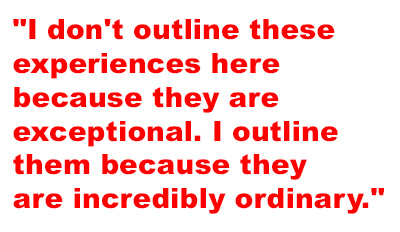 I don’t outline these experiences here because they are exceptional. I outline them because they are incredibly ordinary. And I imagine there is a high likelihood that many women in pipe bands will have their own version of similar events, big and small, that they’ve had to deal with simply on the basis of their existence as women, occupying a male space.
I don’t outline these experiences here because they are exceptional. I outline them because they are incredibly ordinary. And I imagine there is a high likelihood that many women in pipe bands will have their own version of similar events, big and small, that they’ve had to deal with simply on the basis of their existence as women, occupying a male space.
So what does Harvey Weinstein have to do with pipe bands? And what makes the pipe band world a particularly fertile breeding ground for gender-based violence?
First, pipe bands are the historic legacy of a male-dominated pastime. As women, despite our prominence as a collective or our competition success as individuals, we are still the minority in a male space. Women’s ascendance into the ranks of top pipe bands and the platforms of elite solo competition has not been a passive development. These pathways were opened for us by women who had to break down walls, challenge norms, and push boundaries, even to be allowed to participate. And while gender dynamics within pipe bands have no doubt improved greatly since our women pioneers first blazed the trail for us 40 years ago, women in pipe bands today are still subject to a culture of male behaviour that varies in degree from being fun and enjoyable in some contexts, to derogatory and harmful in others. Some spaces within pipe bands might finally be gender-neutral, but others are most certainly not. We’re still working to carve out spaces for ourselves. We’re still working to reshape our community into a place which is fully inclusive. We may have come far, but we are certainly not there yet.
Second, in the piping and drumming community, we operate strongly in a culture shaped by “tradition.” If we want to be successful in pipe bands, we opt-in to a kind of tacit acceptance to continue in the vein of things as they’ve always been done. We play the tunes we’ve always played; we compete in the formats we’ve always competed in; we go to the competitions we’ve always gone to; and we consult the authorities we’ve always consulted. Change in pipe bands is a difficult thing. Progress and innovation are measured in small increments.
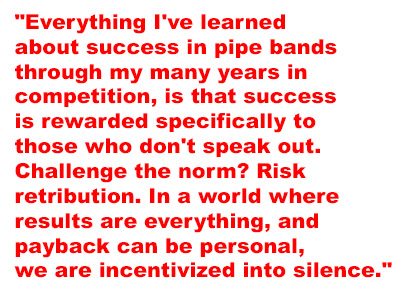 Now, imagine being a woman in pipe bands, challenging the status quo of a dominant male culture, which has historically been discriminatory towards your gender, as well as harsh towards dissenters. It goes against the grain to rock the boat. Indeed, everything I’ve learned about success in pipe bands through my many years in competition, is that success is rewarded specifically to those who don’t speak out. Challenge the norm? Risk retribution. In a world where results are everything, and payback can be personal, we are incentivized into silence.
Now, imagine being a woman in pipe bands, challenging the status quo of a dominant male culture, which has historically been discriminatory towards your gender, as well as harsh towards dissenters. It goes against the grain to rock the boat. Indeed, everything I’ve learned about success in pipe bands through my many years in competition, is that success is rewarded specifically to those who don’t speak out. Challenge the norm? Risk retribution. In a world where results are everything, and payback can be personal, we are incentivized into silence.
Third, the pipe band world is one in that the confluence of power, hierarchy, and prestige, creates a potent enabling environment in which we protect those at the top. What do I mean by this? I mean, pipe bands operate in a “celebrity culture,” where social status within the scene is linked to competition success, and branded products, leadership positions, and so on. And we absolutely protect our celebrities. World Champion? Grade 1 bandsman? Gold Medallist? Producer of our favourite piping and drumming product? There’s an element of social protection enjoyed by those at the top of the game. Go to the very top – the famous leaders and medallists who are the stuff of living legend – and in the eyes of the pipe band populace, it’s almost impossible for such people to do wrong. Except of course, that all people are accountable for their actions, and playing an instrument well has nothing to do with being an ethical human being.
When we elevate our top musicians to an elite status that makes them untouchable, we enable their behaviour. And this is exactly what happened in the case of Harvey Weinstein. And Bill Cosby. And Jimmy Saville. And myriad other cases where “celebrity” was the very mechanism through which people were able to sustain abuse. It’s hard enough for someone to come forward regarding any kind of abuse. How much harder is it if that abuser is a pipe band judge? Or a teacher, pipe band leader, or celebrated prize-winner?
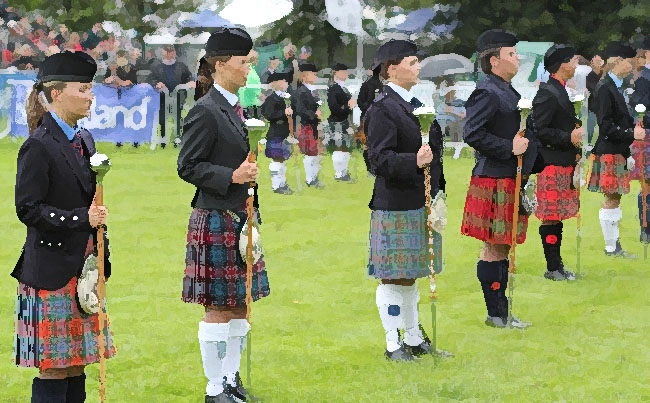 These questions are rhetorical, but they aren’t hypothetical. I know women who have spoken out against such people. I’ve seen first-hand how it is often the victim, not the abuser, who has pulled away from the scene as a result. These things have happened. They’re happening now. We all know the Harvey Weinsteins of our community. We’re all aware of powerful and influential predators in our own scene whose personal track record of serial harassment and assault would rival any of the big scandals to hit the news in recent weeks. We know about those who abuse teaching and mentoring positions in schools and bands to befriend, target, and groom children (boys and girls alike); we know about those with a track record of physical and sexual assault, who are still invited to teach workshops, perform in recitals, and are given elite status in the ranks of top bands. We know who these people are. Yet still, we protect them; we rally around them; we idolize them; we enable them.
These questions are rhetorical, but they aren’t hypothetical. I know women who have spoken out against such people. I’ve seen first-hand how it is often the victim, not the abuser, who has pulled away from the scene as a result. These things have happened. They’re happening now. We all know the Harvey Weinsteins of our community. We’re all aware of powerful and influential predators in our own scene whose personal track record of serial harassment and assault would rival any of the big scandals to hit the news in recent weeks. We know about those who abuse teaching and mentoring positions in schools and bands to befriend, target, and groom children (boys and girls alike); we know about those with a track record of physical and sexual assault, who are still invited to teach workshops, perform in recitals, and are given elite status in the ranks of top bands. We know who these people are. Yet still, we protect them; we rally around them; we idolize them; we enable them.
Equally, not every abuser is high-profile. UN Women estimates that one-in-three women worldwide have experienced sexual and/or physical violence in their lifetime. This isn’t just a problem of celebrity, it’s an issue of power, and abusers exist in every walk of life. In pipe bands, many exist in the intimate spaces of our band halls, pipe band committees, and social gatherings. Think for a minute about your own social networks within bands. We all know that guy, whose behaviour towards women makes us uncomfortable, but who we tolerate because he’s a member of our band. We’ve all been privy to “locker room talk” (to quote the current American president), where the sexualized and demeaning ways in which the male collective speaks about women make us cringe, but still we say nothing and shrug it off as banter. We’ve all been present when one of our peers has had too much to drink and becomes sexually aggressive. We’ve all heard stories of the ways in which a woman’s sexual encounter has been detailed and shared in band WhatsApp groups, and subsequent cyber bullying has led women to withdraw from our scene altogether. And we’ve all watched our bandmates rally around their own, conducting “damage control” as they excuse, apologize, and cover up this behaviour.
We might have participated in this; we might have witnessed this; we might have been the target of this. However, we all know about this. Whether or not the scale of abuse experienced by women is a new revelation, the fact that it happens is common knowledge to us all. When we remain silent on these occasions, we normalize this behaviour. It becomes part of the fabric of our scene. Our silence – our complicity – is the mechanism through which the reproduction of these abuses and inequalities is mobilized.
Why do we remain silent? There is a plethora of written material on why women (and men) remain silent in cases of harassment and assault. However, I posit there are also pipe band specific reasons.
- When the man in question is high profile, women might worry that coming forward will impact their individual competition results, the results of their bands, or their inclusion in certain social circles.
- Social pressure in our scene already exists for us to remain silent in our experience of injustice even in a general sense (for example, in cases of perceived judging bias), and our community is often deeply critical – or at least silent in their support – of those who make official complaints. How do we respond when the accusations are as personal as assault?
- Pipe bands are also highly insular, and it might feel safer for a woman to stay silent than face the speculation of her peers. Victim blaming is very real, and the agony of such experiences being blamed on the woman herself, may feel overwhelming.
- Many of us may genuinely enjoy the social dynamics of our male company, and even take pride in our sense of identity as “one of the guys.” In such cases, we might simply accept “locker-room talk” as one of the aesthetics we just have to live with. When something does happen that crosses our boundaries, however, we might feel that coming forward would jeopardize our already fragile inclusion “in the club.”
- This is critically important – many women do come forward! Women speak out about this all the time! We tell our partners, our leaders, our peers, but to what extent are our stories questioned? To what extent are we taken seriously? To what extent have our male colleagues really been listening?
The Blogpipe article makes a call-to-action, and argues that associations need to adopt a zero-tolerance policy regarding discrimination and abuse of any kind. I commend these policy recommendations, and I think associations have a much greater role to play in opening important dialogues, and reshaping the current culture around all forms of discrimination.
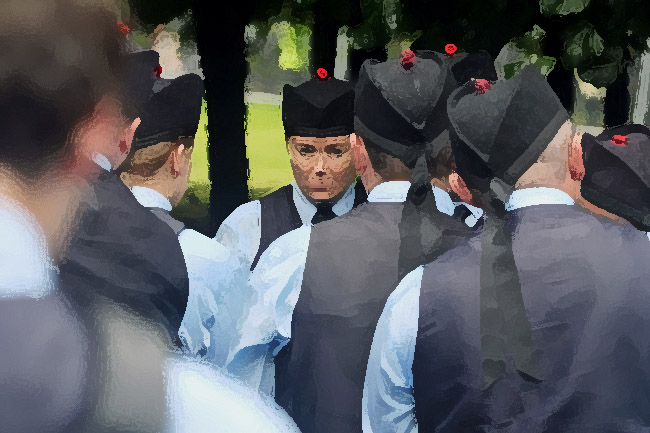 However, I also think we all have a role to play. So much of these exchanges happen in the privacy of our band halls and social circles. How do we respond in these private spaces? Do we challenge behaviour when it happens right in front of us? Do we stand up against harassment, abuse, discrimination, and violence, when we see it? Are we actively reshaping our community in ways which are more inclusive? Or, are we complicit in normalizing and excusing behaviour that is not? Only when we challenge this behaviour can we hope to change it. And this challenge can’t come from women only. Indeed, the power of a male voice calling out the behaviour of his peers, may be paramount to anything we as women could hope to do, even with the help of a trending hashtag. (The fact that it takes so many women’s voices to be heard before we start to believe, is only a further sign of the ways in which women are diminished in our society, in terms of the reliability of their accounts, and ultimately, of their value as people vis-à-vis men).
However, I also think we all have a role to play. So much of these exchanges happen in the privacy of our band halls and social circles. How do we respond in these private spaces? Do we challenge behaviour when it happens right in front of us? Do we stand up against harassment, abuse, discrimination, and violence, when we see it? Are we actively reshaping our community in ways which are more inclusive? Or, are we complicit in normalizing and excusing behaviour that is not? Only when we challenge this behaviour can we hope to change it. And this challenge can’t come from women only. Indeed, the power of a male voice calling out the behaviour of his peers, may be paramount to anything we as women could hope to do, even with the help of a trending hashtag. (The fact that it takes so many women’s voices to be heard before we start to believe, is only a further sign of the ways in which women are diminished in our society, in terms of the reliability of their accounts, and ultimately, of their value as people vis-à-vis men).
Yes, by all means, we should be able to tackle this at the level of associations. But we also need to recognize the agency we all have in changing this culture ourselves, when we can rely on the collective action of our peers to help us do it.
Lessons for men: Ultimately, changing the culture of discrimination, harassment, and abuse means changing the ways in which we enable and protect abusers. If you’re a man reading this and you count yourself among the demographic of people who have been truly shocked by just how many women have come forward to write #metoo, I urge you to think really critically about this issue close to home. How might you have been complicit? What kinds of abuse and discrimination have you been witness to, but never stopped? What could you have done differently? To what extent have you heard the accounts of women, but not taken them seriously? On the whole, I’ve met some truly outstanding men in pipe bands, who have been among the most honourable I’ve found anywhere. However, I can still count on one hand the number of times a man has intervened to challenge the behaviour of another man in front of me. As a man, you have considerable power to mediate this behaviour, in ways which women may not. Don’t be the guy who stays silent.
If you’re an event organizer: If you’re organizing a workshop, recital, or event, think critically about who you invite. I’m not advocating a vigilante witch-hunt based on speculation of abuse. But, in cases where known abuse has been documented, or where students or teachers have complained about the inappropriate behaviour of one of your invitees, don’t invite them back. If you can’t see past this when it’s close to home, think of the celebrity cases, such as the number of event invitations still offered to BBC presenter Jimmy Saville, despite widespread knowledge of his serial abuse of hundreds women and children. By all means, don’t engage in speculation, but do take seriously the accounts of witnesses and victims when they report. Don’t continue to financially and socially reward known abusers. You only continue to prop up their elite status, and contribute to the circle of protection they are able to enjoy, which enables further abuse.
Lastly, a message for women: If you are a woman piper or drummer who is passionate about your hobby and the scene that connects us all, remember just how important a role you play in shaping a future for the other women who will follow you. Only a few decades ago, your very participation would have been radical. Your inclusion today is still profound. We are all pioneers. We are all paving the way for future generations. If you experience behaviour that challenges your participation, please remember who is really at fault. It’s not you. (And if you have not experienced this, be grateful that you are not among the 35 per cent of women worldwide who have. But, by all means, do not allow your story to be used to undermine the accounts of the women who have not been as fortunate. And, as a special message to the women who have experienced the kind of discrimination and abuse outlined above, please remember, #metoo.
Megan Canning is a five-time Grade 1 World Pipe Band Champion, and winner of 23 RSPBA major championships. She is a former piper with Shotts & Dykehead Caledonia, Field Marshal Montgomery, Strathclyde Police, and Prince Charles pipe bands. Canning is a PhD candidate at the University of Edinburgh, and holder of the University’s Chrystal Macmillan scholarship, awarded for research in the areas of feminism and social justice.
What do you think? Please use our comments system below to add your voice to this essential discussion.

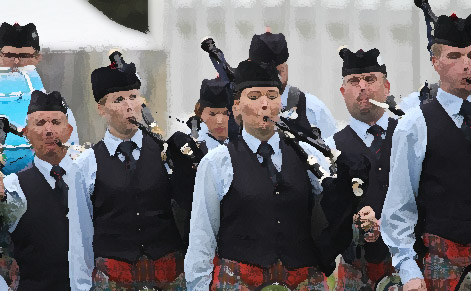

Extremely well stated.
Thank you, Megan. I can certainly think of a few people whose behavior has been unacceptable yet never really challenged. I sincerely hope the current climate and words such as your own will help all of us, male or female, reject the behaviors you describe. No one’s talent in any arena is larger than the importance of decency and ethics.
Very well written and necessary article. This is a topic that almost everyone in pipe bands knows exists but too many are unwilling to outwardly acknowledge. Leaders, nay members of pipe bands need to step up and shut down this behaviour head-on, rather than pretend it doesn’t happen, accept it as ‘usual’, or hide it lest it reflect poorly on them. But protecting the harasser reflects poorly on them and the band. Those men who really think harassment and discrimination aren’t pervasive in pipe bands need to start having genuine conversations with their female bandmates.
Truer words have never been spoken ( to use a well- worn but very apt phrase). All this really hits home when you have a daughter in the game.
Brilliant article Megan. I registered with pipes|drums so I could comment. Obviously you cannot name names but we all know the score. However I do believe that nothing will change. You can be sure of it. The pipe band game absolutely stinks and you can guarantee that the people at the very top and also those lower down the chain will continue as before and will be enabled by all the lackeys around them. Hanging on their every word, back slapping and laughing at all their pathetic jokes. Go to any public piping event and take a look around you. It’s excruciating and sick making. The desperation for success or merely keeping a band on the road rules all, and as a result anything goes. Well done!